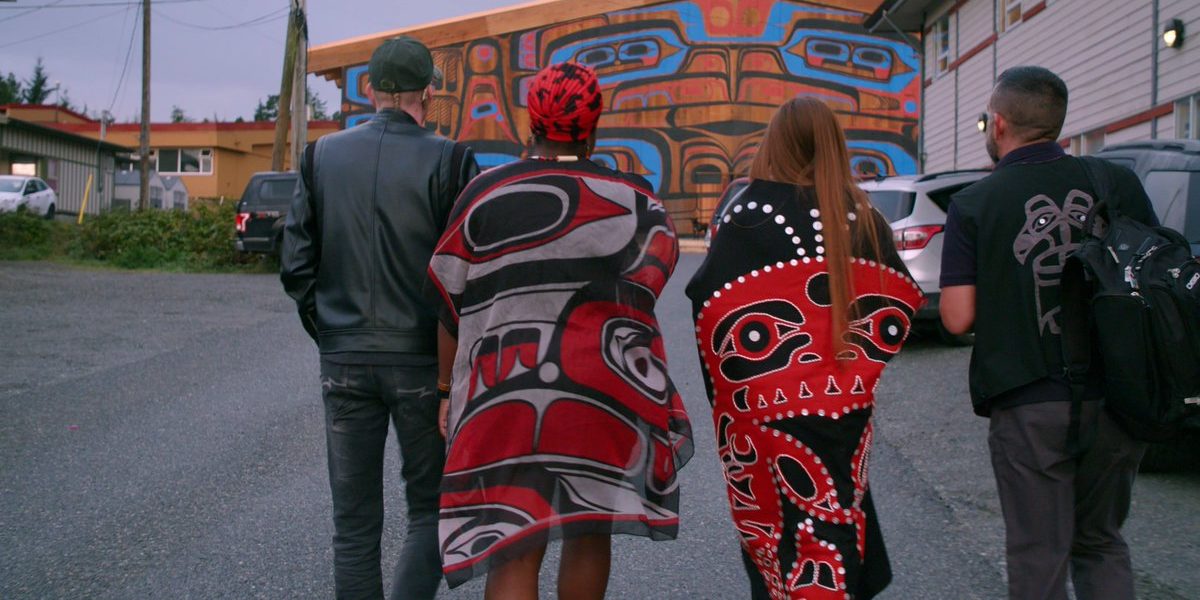Back in 2016, Yasmine Mathurin, a Haitian Canadian filmmaker based in Toronto, Ont., was scrolling through her Facebook feed when she came across a news story about an old childhood friend.
Josiah Wilson, a Haitian Canadian who was adopted and raised by a Heiltsuk Nation family in Calgary, Alta., made headlines when he was banned from competing in the All Native Basketball Tournament—solely because he did not have Indigenous blood. The Blood Quantum rule, a colonial policy used to determine Indigenous status, was invoked and he was barred from playing a sport he loved. Under this rule, he was not considered Indigenous.
“Naturally his family was pretty upset at that, and his Nation was also upset, and so they rallied against the ban—and they were like, ‘no, he’s one of ours,’” said Mathurin in an interview with rabble.ca
Wilson, who was 21-years-old at the time, suddenly found himself in the middle of these complex national conversations around race and identity.
“[What] drew me to this story was the fact that on news headlines, the way that it was framed, it was like really asking a lot of big questions. It was like, what does it mean to be Indigenous? Those are real, real questions,” said Mathurin. “I felt like it was asking all these big political questions of somebody who I knew, who just loved basketball and just wanted to play a game he loves.”
Mathurin was first introduced to Wilson when she moved to Calgary in her teenage years. She stayed connected with the Wilson family through the Haitian community and was even part of a Haitian dance group with Wilson’s sister. When Mathurin moved away, they only kept in touch through Facebook. Then when Wilson’s name started to appear in the news and on her Facebook feed, she reached out.
“I was really curious about how he was doing as a person with this massive spotlight on him as far as who he is. I don’t know anyone who knew who they were for real, for real, at like 21 and that kind of drew me to want to tell this story,” said Mathurin.
One of Ours, a 2021 feature documentary directed by Mathurin, follows the aftermath of Wilson’s ban from the All Native Basketball Tournament and his journey through healing while posing questions around identity—what does it mean to Indigenous? What does it mean to be Black?
The Blood Quantum rule is a direct legacy of colonialism that stated that individuals with at least ¼ Indigenous blood were considered Indigenous. For decades, this policy has harmed many First Nation communities by forcing this colonial definition on Indigenous identity.
“Ultimately like Don, [Wilson’s father], says in the film, it leads to the complete erasure of Indigenous folks. When I think about that policy in general, I think about how similar it is to the One-drop rule in the US,” said Mathurin.
“All of these things are parallel. All of these things are legacies of colonialism. For myself when entering my journey into making this film, even if I am not Indigenous, I recognized the very real colonial legacy of what that policy is because it’s also very real for black folks, right? It’s different, but there’s also a ton of similarities,” said Mathurin.
Wilson’s story also highlighted the importance of family and community, especially through times of hardship. As Wilson’s Indigenous identity was questioned, his family and his Heiltsuk community stood behind him—they played a crucial role in his personal journey towards healing. At the same
“It’s a film that highlights the reality of anti-black racism in a lot of spaces, including Indigenous spaces—which is a difficult subject matter that isn’t spoken of often,” said Mathurin.
“I hope that at least by highlighting Josiah’s story allows for folks to really think about challenging moments of anti-black racism and really taking the time to unpack what that looks like because it’s deeply complicated and it’s also very unique to different communities.”
When One of Ours debuted at the 2021 Hot Docs Canadian International Documentary Film Festival, it resonated with audiences for the film’s raw emotion while touching on complex topics.
“This intimate coming of age story adeptly and lovingly examines the nuances of race, sexuality and family relationships in present day Canada in all its glorious and heartbreaking messiness. With such exceptional access the film reassures the viewer that tenderness and acceptance and respect remain front and center of the story,” noted the 2021 Hot Docs Jury.
Mathurin’s documentary won the 2021 Special Jury Prize for Canadian Features Documentary and later received three Canadian Screen Award nominations. She hopes that when people watch this documentary, that people can reflect on different aspects in their own lives.
“My hope in making this film is that it’s going to be a story that people can kind of connect to in some capacity—even if they don’t connect to Josiah specifically. The Wilson family is such a beautiful dynamic family that I think anybody can relate,” said Mathurin. “When you see a family like that that’s able to rally around each other when somebody’s going through it—I mean, this is a film about healing and the importance of community when faced with all these difficulties.”
Later this year, Mathurin will be releasing an untitled documentary series with CBC. As she continues her journey as a filmmaker, she wants to tell stories that have a lasting emotional impact. “I want to tell stories that make people feel something and hopefully challenge their imagination of what Black life looks like in Canada. That’s something I think a lot about because so much about what we think blackness is—it’s completely seeped in African American experiences, and I don’t know if we know what it means to be Black in Canada,” said Mathurin.



